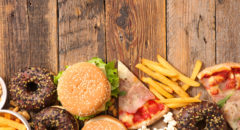
Food addiction can be as addictive as alcohol or drugs. In the U.S., binge eating disorder (BED) is the most common eating disorder, affecting 3.5 percent of women, 2 percent of and up to 1.6 percent of adolescents, according to the National Eating Disorders Association (NEDA). If you or someone you love is counted among this number, it's important to know that recovery from BED doesn't happen in a single moment. Sustained recovery, says NEDA, requires planning and ongoing support.
READ: Looking For Treatment For Binge Eating Disorder? Find It Here
BlackDoctor.org spoke with Dr. Rachel Goldman, a licensed psychologist specializing in weight management and disordered eating, about binge eating disorder and preventing a relapse. Dr. Goldman is currently Senior Psychologist at the Bellevue Center for Obesity and Weight Management and Clinical Assistant Professor of Psychiatry at NYU School of Medicine.
BlackDoctor.org: What’s the difference between binge eating and satisfying food cravings?
Dr. Rachel Goldman: Binge eating is when you eat an amount of food larger than the typical amount of food consumed in a short period and feels out of control. When someone eats ice cream and makes the conscious decision to do so, this is different versus impulsively doing so. Binge eating typically involves feeling guilty afterwards or restricting yourself from food either before or after the binge. Satisfying cravings in moderation is fine, but some individuals can’t stop with small amounts.
BlackDoctor.org: What triggers binge eating?
Dr. Rachel Goldman: Binge eating doesn’t just happen. There are triggers. I work with patients to first identify what they are doing and the chain of events that lead up to binge eating. This action helps the patient to break the chain or link and figure out why it happened.
BlackDoctor.org: What can a person do if they feel a binge relapse is coming on?
Dr. Rachel Goldman: Identify what’s happening. When we discipline our kids, we have them take a time out so they can step back from the situation and think about what’s going on. Adults can do something similar. They can take a mini or adult time out. Think about what is going on and seek out an alternative action. Take a walk, read a book or call a friend instead. The trigger is usually emotional. Be mindful and do an activity to help to stop the relapse from happening.
BlackDoctor.org: How can a past binge eater prevent a binge relapse from happening?
Dr. Rachel Goldman: There is a negative emotion which usually precipitates a binge relapse. It can include having a bad day or sadness with something happening in your life. I liken the emotional aspect of binge relapse to kids acting out. When a person is impulsive, we may act out by eating. . This kind of eating is an irrational and impulsive act. When this happens, seek a better alternative.
BlackDoctor.org: If you have a friend or loved one suffering from disordered eating, what are some signs?
Dr. Rachel Goldman: If they isolate themselves, stop going to social functions where there is food because they feel people will judge how they eat or if they are excessively working out, these can be some signs. Also, if they constantly make excuses to get out of eating this can be another sign.
BlackDoctor.org: Where can a person turn to for help?
Dr. Rachel Goldman: I suggest they seek out a professional who specializes in weight management or disordered eating because everyone doesn’t treat or recognize [the] symptoms.
Dr. Goldman reiterates it’s important to remember that we’re all human and make mistakes. If you have a binge relapse, realize it’s over and move forward. Don’t beat yourself up. Get back on track immediately. Eat small healthy meals throughout the day to prevent the behavior from recurring. Your relapse doesn’t have to be an excuse to continue to binge later, and you don’t have to move forward alone.
For more disordered eating information and resources, click here.








